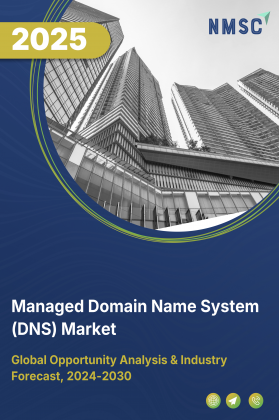
The Managed Domain Name System (DNS) Market is segmented by Protocol Type (IPv4 DNS, IPv6 DNS, Encrypted DNS), by Service Type (Primary, Secondary, Recursive, Authoritative), by Deployment Model (Cloud-Based, On-Premise), by Enterprise Size (Large Enterprise, SMEs), by Application (Web Presence Optimization, Content Delivery, DDoS Protection, Network Performance Monitoring), by Industry Verticals (IT, BFSI, Healthcare, E-commerce) – Global Opportunity Analysis and Industry Forecast, 2025–2030
Industry Outlook
The global Managed Domain Name System (DNS) Market size was valued at USD 1.04 billion in 2024 and is predicted to reach USD 1.22 billion by the end of 2025. The industry is predicted to reach USD 2.76 billion by 2030 with a CAGR of 17.7% from 2025-2030.
The managed domain name system (DNS) market is experiencing accelerated growth, driven by the increasing complexity of cyber threats, widespread cloud adoption, AI integration, and the need for secure, scalable infrastructure. Organizations are turning to managed DNS services to protect against rising risks such as DDoS attacks, DNS hijacking, and data breaches, with advanced features like DNSSEC, real-time monitoring, and automated threat detection proving critical.
The shift to cloud-native architectures, supported by providers like Amazon and Microsoft, is fueling demand for cloud-based DNS solutions. Additionally, the integration of DNS with DHCP and IP address management (DDI) is enhancing network visibility and operational efficiency, especially in high-scale environments like India. AI-driven automation presents further opportunities, with intelligent DNS systems optimizing traffic and reducing manual errors. However, high initial costs remain a key restraint, particularly for MSMEs in emerging markets. Overall, the market outlook is robust, with digital transformation driving sustained demand.
Increasing Cyber Threat Landscape Drives the Market Growth
The growing complexity and frequency of cyber threats such as Distributed Denial of Service (DDoS) attacks, DNS hijacking, cache poisoning, and phishing have become a major driver of the market. As organizations face heightened risks of service disruption, data breaches, and reputational damage, they are increasingly turning to managed DNS providers for enhanced security, reliability, and performance. Managed DNS services offer advanced security features including real-time traffic monitoring, automated threat detection, DNSSEC (Domain Name System Security Extensions), and built-in DDoS mitigation. These capabilities are critical in protecting online assets from malicious actors targeting the DNS layer, which is foundational to internet functionality.
In 2024, the Identity Theft Resource Center reported 3,158 data compromises, consistent with previous record levels. Notably, victim notifications surged by 211% to 1.3 billion, driven by five mega-breaches, each impacting over 100 million individuals in U.S. These alarming trends underscore the increasing vulnerability of digital infrastructure, particularly at the DNS layer. Therefore, the growing cyber threat landscape is emerging as a significant driver of managed DNS market expansion.
Cloud-Based DNS Services Fuels the Managed Domain Name System Market Growth
Cloud-based DNS services are a key driver of the managed DNS market trends, driven by the growing enterprise shift toward scalable, secure, and resilient cloud infrastructure. These services provide global reach, automated failover, and built-in security features like DNSSEC and DDoS protection, making them critical for maintaining uptime and mitigating cyber threats. The rise of cloud-native architectures and DevOps integration further accelerates adoption by enabling dynamic, API-based DNS management. Supporting this trend, the Cloud Security Alliance (CSA) with over 80,000 members worldwide, actively advocates DNS risk reduction as a best practice, reflecting the widespread industry focus on strengthening DNS security within cloud environments.
Leading cloud-based DNS providers such as Amazon Route 53 and Microsoft Azure DNS are enabling businesses to optimize their web presence and enhance customer experiences. As more organizations migrate to the cloud, the adoption of managed DNS services is expected to continue growing, with companies leveraging these solutions to scale their infrastructure and improve performance across global networks.
Integration of DNS with Other Network Services Enhances Managed Domain Name System Market Potential
Integration of DNS with other network services is emerging as a key driver of the market, as organizations increasingly seek unified and automated network management solutions. For instance, in India, home to over 1.19 billion telecom subscribers as of September 2024 as reported by TRAI, the vast scale and complexity of its digital infrastructure necessitate the efficient integration of DNS with DHCP and IP address management, collectively known as DDI. This integration streamlines operations, enhances security, reduces configuration errors, and supports real-time visibility across distributed networks. As similar large-scale digital ecosystems expand globally, the need for integrated managed DNS solutions continues to accelerate.
High Initial Costs for Enterprise-Level Managed DNS Solutions Hinder Managed Domain Name System Market Demand
High initial costs for enterprise-level managed DNS solutions continue to act as a significant restraint on market growth, especially in price-sensitive segments. These services require substantial upfront investment for setup, integration, and customization, along with recurring charges tied to usage volume, number of domains, and premium security features. For many MSMEs operating with constrained IT budgets, the return on investment appears uncertain or delayed, making it difficult to justify transitioning from in-house or free DNS options, despite their limitations in reliability and security. This barrier is particularly notable in India, where, as of July 2024, over 4.77 crore MSMEs were registered on the Udyam and Udyam Assist Platforms, as reported by the Ministry of Micro, Small & Medium Enterprises. While this growing sector plays a critical role in driving inclusive economic development, its limited financial capacity poses a challenge to the broader adoption of advanced digital infrastructure like managed DNS.
AI-Driven Automation Creates Strong Growth Opportunity for the Managed Domain Name System Market
The integration of automation and artificial intelligence (AI) into DNS management presents a major opportunity for the growth of the market. As enterprise networks grow more complex and cyber threats more dynamic, there is a rising demand for intelligent DNS solutions that offer real-time adaptability, automated threat detection, and smart traffic optimization. Automation minimizes the need for manual configuration and accelerates policy enforcement, significantly improving operational efficiency, security, and uptime across cloud, IoT, and CI/CD environments. This growing interest aligns with broader global and national AI trends.
According to the World Economic Forum in 2025, 72% of businesses have adopted AI, and the technology is expected to contribute 21% of the U.S. GDP by 2030, highlighting its central role in digital transformation. In India, the artificial intelligence market is projected to reach $8 billion by 2025, growing at a 40% CAGR from 2020 to 2025. As reported by the India Brand Equity Foundation (IBEF) in 2025, over 6,00,000 AI professionals and 700 million internet users in India now accounts for 16% of the global AI talent pool, second only to the U.S. These indicators reflect not only widespread AI adoption but also an expanding technological workforce and user base, creating a fertile environment for AI-powered DNS innovations. As AI-driven infrastructure becomes foundational to digital operations, the managed DNS market stands to benefit significantly from this transformation.
Market Segmentations and Scope of the Study
The managed DNS market report is segmented on the basis of protocol type, service type, deployment model, enterprise size, application, industry vertical, end-user and region. The market is segmented by protocol and traffic type into IPv4, IPv6, and Encrypted DNS (DNS-over-HTTPS, DNS-over-TLS). By service type, it includes Primary, Secondary, Recursive, and Authoritative DNS. Deployment models are categorized as Cloud-Based, On-Premise, and Hybrid, while enterprise size includes Large Enterprises and SMEs. Key applications include Web Presence Optimization, Traffic Routing, DDoS Protection, Network Monitoring, IoT Connectivity, and Multi-cloud Failover. The market spans industry verticals such as IT & Telecom, BFSI, Healthcare, Retail & E-commerce, Media & Entertainment, Government, Education, Energy, and Manufacturing. End users include Enterprises, MSPs, Cloud Service Providers, and CDNs. Regional breakdown and analysis of each of the aforesaid segments include regions comprising North America, Europe, Asia-Pacific, and RoW.
Geographical Analysis
North America remains a dominant region in the managed DNS market, driven by rapid internet penetration and the surge in online services, which significantly boosts demand for DNS infrastructure. According to the Pew Research Center in 2024, 96% of U.S. adults report using the internet, reflecting near-universal digital engagement. Additionally, the United States ranks first globally with over 7,000 Internet Service Providers (ISPs), as per the CIA World Factbook, indicating a highly competitive and expansive internet ecosystem. As businesses increasingly rely on cloud-based services, e-commerce platforms, and real-time applications, the need for scalable, secure, and resilient DNS systems becomes critical to maintaining uninterrupted digital operations and enhancing performance and cybersecurity.
A key driver of the managed DNS market in Europe for is the widespread adoption of cloud computing across businesses, coupled with the region’s strategic push to scale its digital infrastructure. As more organizations shift their infrastructure, applications, and services to the cloud, the demand for reliable, secure, and scalable DNS solutions has accelerated. DNS is foundational to cloud accessibility, service availability, traffic management, and latency optimization across distributed environments. This momentum is further reinforced by the European Commission’s 2025 proposal of the Cloud and AI Development Act, which aims to at least triple the EU's data centre capacity within the next 5 to 7 years, ensuring that both businesses and public administrations fully meet digital demands by 2035.
Additionally, the Edge Observatory 4 Deployment Data Report of 2024, highlights that edge node deployments in Europe surged from 498 in previous years to approximately 1,836 in 2024, a more than 3.5× increase, signaling a rapid decentralization of compute resources. As cloud and edge computing adoption intensifies, enterprises require robust DNS infrastructure to support this distributed landscape, with growing demand for cloud DNS hosting, DNSSEC, DDoS-protected services, and geo-distributed DNS that ensure secure, real-time, and resilient digital service delivery.
One compelling driver of the DNS market in the Asia–Pacific region for is the substantial rise in cybersecurity investments, fuelled by the region’s growing exposure to cyber threats. As digital transformation deepens across sectors like finance, healthcare, e-commerce, and government, organizations are prioritizing the protection of their digital infrastructure, positioning DNS as a frontline defence mechanism. DNS is increasingly leveraged to mitigate risks such as DNS hijacking, phishing, and DDoS attacks through features like threat detection, automated mitigation, and secure resolution protocols. This urgency is particularly evident in India, where cybersecurity concerns have intensified sharply. According to the High-Tech Crime Trends Report 2025 by Group-IB, India accounted for nearly 13% of all global cyberattacks in 2024, emerging as the top target for hacktivist activities.
Furthermore, India reportedly faced 1.5 million cyberattacks in the year, with 150 successful breaches, a ratio that underscores both the scale of threats and the critical need for resilient security infrastructure, including managed and secure DNS solutions. As awareness of these threats grows, public and private sector organizations across the Asia–Pacific region are increasingly adopting robust DNS frameworks, incorporating DNSSEC, DDoS protection, and intelligent routing to ensure secure, uninterrupted access to digital services and safeguard sensitive data across distributed environments.
One of the most impactful drivers of the DNS market in the Rest of World (ROW) is the accelerated growth of digital government initiatives. In many emerging economies, governments are rapidly deploying online platforms for digital identity, tax filing, healthcare, education, and public service delivery, services that are critically dependent on robust DNS infrastructure to ensure fast, secure, and reliable access.
According to the United Nations E-Government Survey 2024, which assessed all 193 UN member states, there has been a strong global shift toward digital governance, marked by a notable rise in the E-Government Development Index and a reduction in the digital divide from 45% to 22% over just two years. As traffic volumes increase and cyber threats become more sophisticated, the demand for advanced DNS solutions, featuring low-latency delivery, geo-redundancy, and protection against DDoS and phishing attacks that continues to grow. DNS, therefore, plays a foundational role in ensuring the accessibility, security, and resilience of digital public services across ROW regions.
Strategic Developments in the Managed DNS Industry
Key players in the managed domain name system industry are actively advancing DNS automation and security through AI-driven innovations, platform-level enhancements, and strategic partnerships.
-
In June 2025, Akamai Technologies launched DNS Posture Management, an agentless, multicloud solution that provides unified visibility across major DNS providers, including Akamai Edge DNS, AWS Route 53, Azure DNS, and Google Cloud DNS offering real-time monitoring, guided remediation of misconfigurations, automated compliance with frameworks such as NIST, PCI DSS, and HIPAA, along with a Certificate Monitor for detecting expired or rogue TLS/SSL certificates and optional 24/7 managed security services.
-
In April 2025, Google Cloud partnered with Infoblox to introduce DNS Armor and Universal DDI for Cloud WAN, delivering advanced DNS filtering and security across multi cloud environments.
-
In April 2025, Microsoft launched a public preview of Zero Trust DNS for Windows 11 Insider users, enforcing domain-based outbound access controls by leveraging encrypted DNS (DoH/DoT) to block connections to untrusted destinations.
-
In November 2024, Amazon Web Services introduced Route 53 DNS Firewall Advanced, enhancing its DNS firewall capabilities to detect and block sophisticated threats such as DNS tunneling and domain generation algorithms (DGAs).
-
In September 2024, Cloudflare launched an ISP & Equipment Vendor DNS Partnership Program, allowing internet service providers and hardware manufacturers to integrate Cloudflare's DNS resolvers at no cost, thereby expanding its presence in the managed DNS market.
Key Benefits
-
The report provides quantitative analysis and estimations of the managed Domain Name System market from 2025 to 2030, which assists in identifying the prevailing market opportunities.
-
The study comprises a deep dive analysis of the managed domain name system market including the current and future trends to depict prevalent investment pockets in the market.
-
Information related to key drivers, restraints, and opportunities and their impact on the managed domain name system market is provided in the report.
-
Competitive analysis of the players, along with their market share is provided in the report.
-
SWOT analysis and Porters Five Forces model is elaborated in the study.
-
Value chain analysis in the market study provides a clear picture of roles of stakeholders.
Managed Domain Name System Market Key Segments
By Protocol & Traffic Type
-
IPv4 DNS
-
IPv6 DNS
-
Encrypted DNS (DNS-over-HTTPS, DNS-over-TLS)
By Service Type
-
Primary DNS Services
-
Secondary DNS Services
-
Recursive DNS Services
-
Authoritative DNS Services
By Deployment Model
-
Cloud-Based
-
On-Premise
-
Hybrid
By Enterprise Size
-
Large Enterprise
-
SMEs
By Application / Use Case
-
Web Presence Optimization
-
Content Delivery & Traffic Routing
-
DDoS Protection & Security Enhancement
-
Network Performance Monitoring
-
IoT Device Connectivity
-
Multi-cloud Networking & Failover
By Industry Vertical
-
IT & Telecommunications
-
Banking, Financial Services, and Insurance (BFSI)
-
Healthcare
-
Retail & E-commerce
-
Media & Entertainment
-
Government & Public Sector
-
Education
-
Energy & Utilities
-
Manufacturing
By End-User
-
Enterprises
-
Managed Service Providers (MSPs)
-
Cloud Service Providers
-
Content Delivery Networks (CDNs)
By Region
-
North America
-
The U.S.
-
Canada
-
Mexico
-
-
Europe
-
The UK
-
Germany
-
France
-
Italy
-
Spain
-
Denmark
-
Netherlands
-
Finland
-
Sweden
-
Norway
-
Russia
-
Rest of Europe
-
-
Asia Pacific
-
China
-
Japan
-
India
-
South Korea
-
Australia
-
Indonesia
-
Singapore
-
Taiwan
-
Thailand
-
Rest of Asia Pacific
-
-
RoW
-
Latin America
-
Middle East
-
Africa
-
Key Players
-
Cloudflare, Inc.
-
Cloud DNS Ltd.
-
NameCheap
-
Amazon Web Services Inc.
-
Microsoft Corporation
-
International Business Machines Corporation (IBM)
-
Akamai Technologies
-
Vercara (DigiCert, Inc.)
-
Google LLC
-
Zoho Corporation Pvt. Ltd.
-
CDNetworks Inc.
-
BuddyNS
-
EasyDNS Technologies Inc.
Report Scope and Segmentation
|
Parameters |
Details |
|
Market Size in 2025 |
USD 1.22 billion |
|
Revenue Forecast in 2030 |
USD 2.76 billion |
|
Growth Rate |
CAGR of 17.7% from 2025 to 2030 |
|
Analysis Period |
2024–2030 |
|
Base Year Considered |
2024 |
|
Forecast Period |
2025–2030 |
|
Market Size Estimation |
Billion (USD) |
|
Growth Factors |
|
|
Countries Covered |
28 |
|
Companies Profiled |
15 |
|
Market Share |
Available for 10 companies |
|
Customization Scope |
Free customization (equivalent up to 80 working hours of analysts) after purchase. Addition or alteration to country, regional, and segment scope. |
|
Pricing and Purchase Options |
Avail customized purchase options to meet your exact research needs. |

















 Speak to Our Analyst
Speak to Our Analyst
























